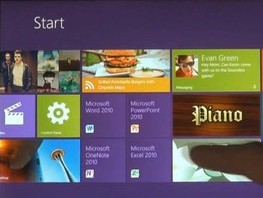
Sign up for breaking news, reviews, opinion, top tech deals, and more.
You are now subscribed
Your newsletter sign-up was successful
Thank God for Microsoft. Not a sentiment I ever thought I'd find myself expressing. Never mind, because none other than the Beast of Redmond is responsible for my optimistic outlook regarding the future prospects of the PC.
Regular readers will know I've made a habit lately of proposing various scenarios in which the PC might meet its demise. What with the rise of cloud computing, do-it-all web browsers and ever more powerful portable devices, there's certainly reason enough to doubt the ongoing role the PC may play in our digital lives.
Viewed dispassionately, you may wonder why that matters. After all, what difference does it really make whether a computing device conforms to the traditional strictures of the PC or not? Why should anyone care whether the chips that power computers are compatible with the x86 or ARM instruction set, for instance? And surely agnosticism to operating systems from the likes of Microsoft, Google or Apple is the only attitude that makes logical sense?
I'm here to tell you differently, and it all comes down to freedom. Put simply, networked PCs are responsible for the sphere of human life that comes closest to delivering true freedom for the individual as well as a level playing field where wealth, influence and cronyism count for much, much less than the physical world.
Granted, the internet verges on anarchy at times, but it's also bursting with uplifting, life-enhancing and liberating information and communities. If you're not sure what I'm getting at, or conversely, you reckon I'm not telling you anything you don't already know, let's try a thought experiment.
A different world
Imagine it was the Apple Mac, rather than the PC, that won the battle for desktop computing dominance. If that had happened, I'm convinced the control freakery Apple indulges in with its iPhone would have emerged much sooner and with devastating consequences.
It's one thing having a group of narrow-minded, self-appointed corporatists decide what software you're allowed to run on your smartphone. It's quite another if you were to inject that prudish, homogenising, hypocritical censorship into the process that saw the PC and internet develop in parallel.
Sign up for breaking news, reviews, opinion, top tech deals, and more.
All of which makes the description of Apple by Steve Jobs as the "intersection between liberal arts and technology" laughable. What do the liberal arts have to do with favouring mediocrity and profit maximisation above freedom of expression? Since when did they ban the exposition of, well, boobs because customers might be offended?
The truth is, Apple has no more to do with the liberal arts than any other big corporation. Of course, Microsoft isn't Bohemia transplanted to a suburb of Seattle, Washington. But you can't argue with the PC's record as an open platform for third party software.
Meanwhile, if you think Google offers an alternative, you need only observe the catastrophically cut-down Chrome OS to understand how badly a world ruled by a search engine could turn out.
Windows 8
With all that in mind, I was relieved and enthralled in equal measure by Microsoft's Windows 8 preview at the Computex show in Taiwan. Finally, it seems, Microsoft gets mobile computing. Windows 8 may not succeed as a tablet operating system, but its promise of a platform that combines the slickness and intuitiveness of the best mobile OSes with the power, flexibility and freedom of Windows is compelling.
I won't know for sure until it is released, but as things stand, Windows 8 could be the OS that finally turns me on to tablets. More importantly, it doesn't need to dominate to push the broader mobile market away from Apple's walled garden towards a world where we have full control over the devices we pay for. Wither, I hope, the iPad's ludicrous restrictions.